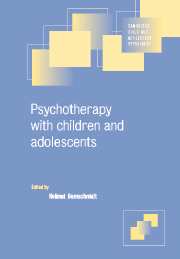Book contents
- Frontmatter
- Contents
- List of contributors
- Preface
- Part I Principles of psychotherapy with children, adolescents and families
- Part II Psychotherapeutic methods and settings
- 5 Psychodynamic therapy
- 6 Behaviour therapy
- 7 Cognitive behaviour therapy
- 8 Interpersonal psychotherapy for adolescents
- 9 Play therapy with children
- 10 Individual psychotherapy with adolescents
- 11 Group psychotherapy and psychodrama
- 12 Family therapy
- 13 Parent training
- 14 Combination of treatment methods
- Part III The practice of psychotherapy for specific disorders in childhood and adolescence
- Part IV The practice of psychotherapy in various settings
- Index
13 - Parent training
- Frontmatter
- Contents
- List of contributors
- Preface
- Part I Principles of psychotherapy with children, adolescents and families
- Part II Psychotherapeutic methods and settings
- 5 Psychodynamic therapy
- 6 Behaviour therapy
- 7 Cognitive behaviour therapy
- 8 Interpersonal psychotherapy for adolescents
- 9 Play therapy with children
- 10 Individual psychotherapy with adolescents
- 11 Group psychotherapy and psychodrama
- 12 Family therapy
- 13 Parent training
- 14 Combination of treatment methods
- Part III The practice of psychotherapy for specific disorders in childhood and adolescence
- Part IV The practice of psychotherapy in various settings
- Index
Summary
Parent training is a specific and systematic approach to cooperating with parents. Cooperation with parents is an essential part of treatment in child and adolescent psychiatry and should not be neglected (Briesmeister and Schaefer, 1998).
Parent training requires a positive therapeutic attitude. It has been shown that psychotherapy is most effective when the family's psychosocial situation is promising and the family is willing to support treatment (Mattejat and Remschmidt, 1991).
A normal family is a protective factor for a child's psychological development. This beneficial effect can be used to support therapy. However, parents also bear the responsibility of directing treatment when problems arise. As long as the child lives in a family, the family will influence the child's development to a greater extent than any other care-givers or educators. Parents are an integral part of a child's environment, and changes in parental behaviour have a significant influence on the way the child experiences his environment.
Parents who are concerned about abnormal behaviour in their child will usually seek professional help. Simultaneously, parents will be grateful if their competence as parents is acknowledged by professionals. As professionals, we usually rely on parents' competence in child-raising and request their cooperation when we undertake psychotherapy. Studies looking at parent training have shown that many parents are able to acquire some psychotherapeutic techniques and use them effectively to support their child's development (Innerhofer, 1977; Warnke and Innerhofer, 1978; Briesmeister and Schaefer, 1998).
The interaction between the therapist and parents should be considerate, tolerant, empathic, supportive and without reproach. The family's need for help may be understood as an opportunity to give up outdated and superfluous values and attitudes in order to improve outlook on life, develop new interests, aims, skills and options.
- Type
- Chapter
- Information
- Psychotherapy with Children and Adolescents , pp. 212 - 233Publisher: Cambridge University PressPrint publication year: 2001

